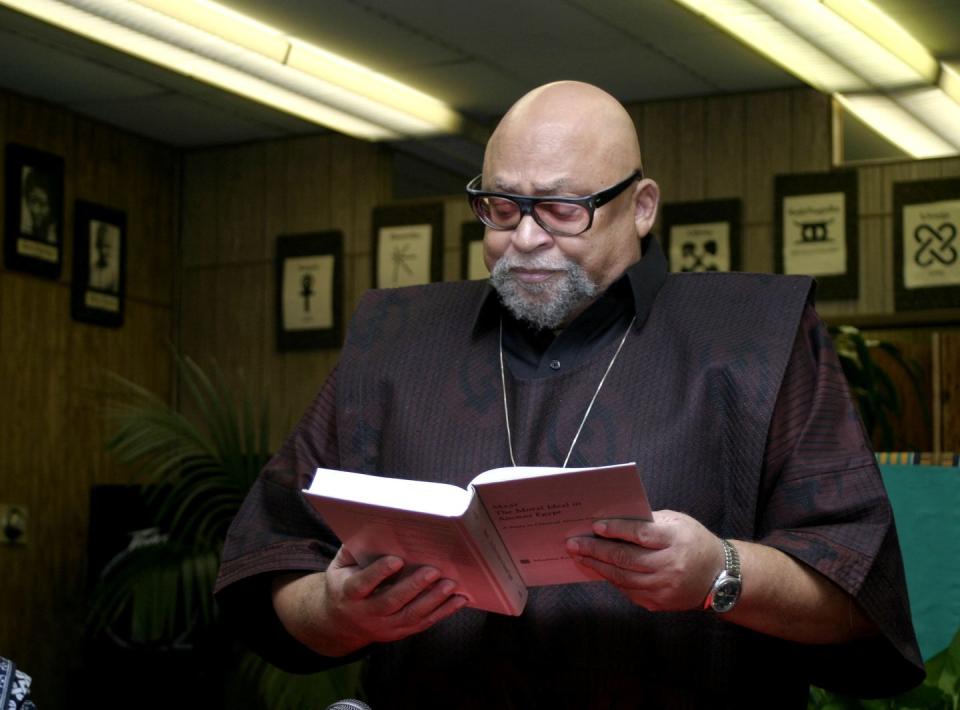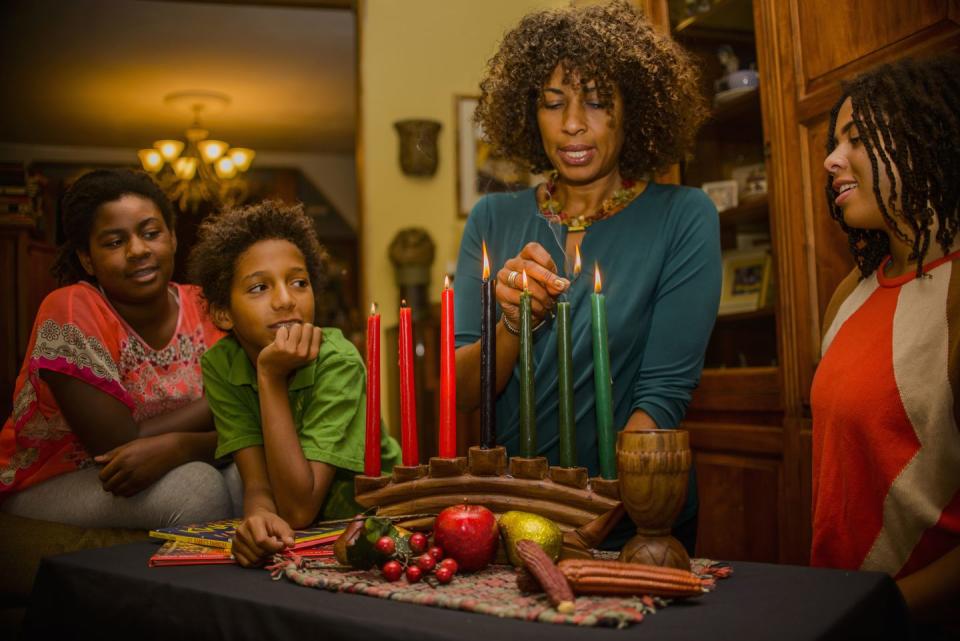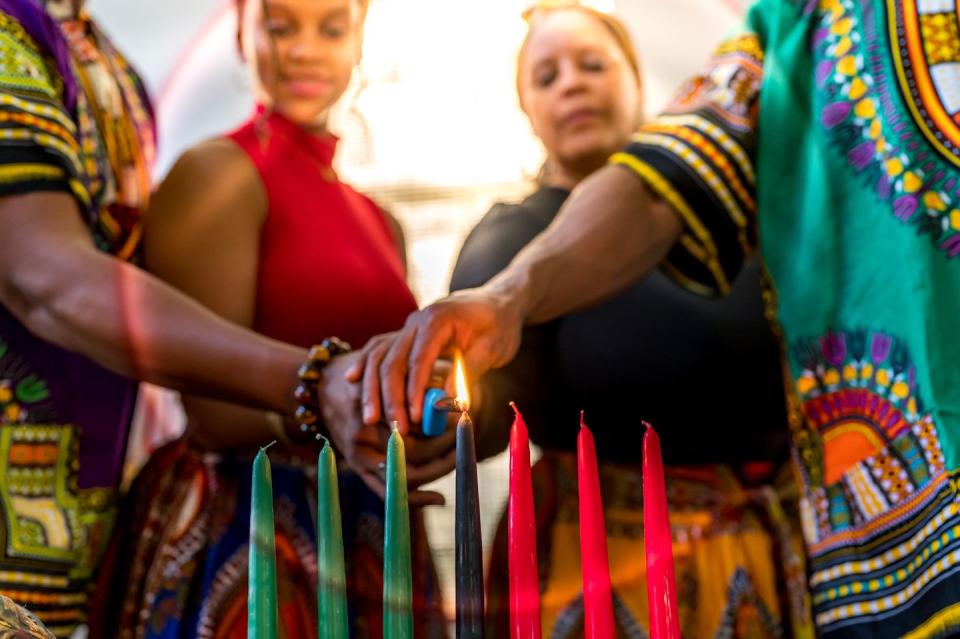The 7 Principles of Kwanzaa Give More Meaning to the Holiday
The holiday season is in full swing, which means gathering with friends and family to celebrate Christmas, Hanukkah, and Kwanzaa. While many people know that Kwanzaa falls around the same time as Christmas, not everyone fully understands the significance of the holiday or what celebrating it entails. If you want to learn more about the origin of Kwanzaa, its meaning, and the 7 principles of Kwanzaa, you've come to the right place.
What is Kwanzaa?
For starters, Kwanzaa is an African American and Pan-African holiday, which celebrates family, community, and culture, according to the official Kwanzaa website. The name comes from the Swahili phrase, “matunda ya kwanza,” which means “first fruits.” The expression refers to the first harvest celebrations in Africa. These ancient traditions were organized around fundamental activities that live on today.
For Rashadd Hines, a Chicago native who now resides in D.C., Kwanzaa is a holiday that he looks forward to each year. “With so many obstacles that many Black people face around the world, Kwanzaa is a time where African Americans can reflect on the positivity, family, and working together to set the blueprint for progressively moving forward. It is absolutely necessary and I’m happy that it is celebrated more widely now,” he tells Woman's Day.
Who started Kwanzaa?

Inspired by those African traditions, Maulana Karenga, PhD, and professor and chair of the Department of Africana Studies at California State University, Long Beach, built on that foundation and created Kwanzaa in 1966. It’s not by chance that the holiday came to be during the height of the Civil Rights Movement.
“It was created as an act of cultural recovery and reconstruction,” Karenga states on the Kwanzaa website.
When is Kwanzaa?
Kwanzaa is a week-long celebration. This year, Kwanzaa begins on Tuesday, December 26, 2023 and lasts through Monday, January 1, 2024.
What are the Seven Principles of Kwanzaa?
During the holiday, families and communities organize activities centered around Nguzo Saba, also called the Seven Principles. Each day of Kwanzaa represents one of the seven principles, and a candle is lit on the kinara (candle holder) for each.
While every family celebrates the beauty of the culture in their own way, they all follow ideals presented by the 7 Principles of Kwanzaa, stated in Swahili and translated as follows:
Day 1: Umoja (Unity)
To strive for and maintain unity in the family, community, nation, and race.
Umoja not only reminds people to come together physically, but morally. This can mean your willingness to stand up with your community for a common cause or showing solidarity, because no one accomplishes anything alone. Umoja emphasizes that we are capable of anything once we come together.
Day 2: Kujichagulia (Self-Determination)
To define ourselves, name ourselves, create for ourselves for ourselves and speak for ourselves.
Whether a quiet stance or loud shout, your voice alone is enough to affirm what you are — no approval necessary. When you are firm in who you are, it’s easier to realize that you don’t need to wait for another group to define your role and where you stand. Most importantly, you are capable and within your rights to recall your history as Black people and shape your life as you see fit without the encouragement of another group.
Day 3: Ujima (Collective Work and Responsibility)
To build and maintain our community together and make our brother's and sister's problems our problems and to solve them together.
Not only are you collectively responsible for success, but you are responsible for the setbacks as well. Commitment to criticism and development is essential to the wins of the community. And when you learn, support each other, and triumph with each other, you witness Ujima in action.
Day 4: Ujamaa (Cooperative Economics)
To build and maintain our own stores, shops and other businesses and to profit from them together.
Under this principle, you are intended to thrive financially as a community. That means recognizing the power of the Black dollar by creating — and supporting — those businesses. When that happens, you can start building generational wealth which can aid in creating assets and financial foundations that can be passed down as we work to close the wealth gap.
Additionally, you must practice generosity. Do what you can to lift others out of poverty so security can be established in the Black community.
Day 5: Nia (Purpose)
To make our collective vocation the building and developing of our community in order to restore our people to their traditional greatness.
Nia encourages you to find your why, which is deeply rooted in restoring your greatness in the connection to the collective. It also lends to the importance of finding purpose in protecting your legacy as “fathers and mothers of humanity,” according to the official Kwanzaa website.
Day 6: Kuumba (Creativity)
To do always as much as we can, in the way we can, in order to leave our community more beautiful and beneficial than we inherited it.
Use your gifts to assist your community in reaching its potential and leaving it even more beautiful than you found it. Your creativity is essential to growth and revitalizing the community.
Day 7: Imani (Faith)
To believe with all our heart in our people, our parents, our teachers, our leaders and the righteousness and victory of our struggle.
Without the belief in your values and your place in the community, nothing else will be sustained. Additionally, without faith in your community and what your community is willing to do there is little chance for it to thrive.
Hines, who was introduced to the holiday by a close friend in 1998, upholds these principles throughout the year. “Nia (purpose) is a very important principle to me because it gives me focus and keeps me on track with my goals,” he says. “I wake up every day and reflect on why I exist. I believe that we are all here for a reason and thinking about my purpose drives me to live my life to the fullest. Umoja (unity) is another principle that I continuously focus on since my circle of family and friends are important to me. I regularly plan and participate in events/gatherings that bring people together — and I try to sprinkle a little bit of Kuumba (creativity) to make those encounters fun, rich, and memorable.”
How can I celebrate Kwanzaa at home?

There is a traditionally established way of celebrating Kwanzaa, which involves two main components that are central to the holiday: The Kwanzaa colors and the kinara, a seven-branched candle holder.
First, the colors associated with the holiday are red (the struggle), green (the future and hope), and black (the people). Each of these colors are represented with the candles that are placed in the kinara and lit each day of Kwanzaa.
Participants also celebrate with singing, dancing, storytelling, and more. Additionally, food is an integral part of the holiday. Large meals are prepared and shared while celebrants honor their ancestors, strengthen bonds and promote fellowship.
Hines and the friend who introduced him to the holiday have been celebrating for 25 years now. “I have connected with so many amazing people through our Kwanzaa events every year and each gathering calibrates my objectives for the next year," he says. "I absolutely love the fellowship as well.”
The holiday ends with a day dedicated to reflection and a recommitment to the Seven Principles and other central cultural values.
Can people celebrate Christmas and Kwanzaa?

Centered around family and community, Kwanzaa isn’t a religious holiday. So, it is open to people of all faiths to share in the festivities and celebrate. While it starts the day after Christmas, it is not intended to be a replacement for the Christian holiday.
Do people exchange gifts on Kwanzaa?
While gift-giving isn’t central to the holiday, children are often the recipients. These gifts must always include a book and a heritage symbol. The book emphasizes the African value and tradition of learning, and the heritage symbol reinforces the African commitment to tradition and history.
For Hines, he loves that the holiday isn't centered around gifts. “Kwanzaa is not about buying expensive gifts,” he says. “It’s truly about us coming together to strengthen and inspire.”
You Might Also Like


